Today August, Lúnasa, blows in on the West wind and by the old ways Autumn is already upon us. It is evident in the fields and hedgerows; rowan berries and haws reddening, elderberries darkening, trees laden with ripening apples, and those golden fields cut all in a rush when we had the smallest hint of a fair day. The leaves are turning slowly, and I have my woollens on to write inside this cold old house. We did not get out for Bilberries on Sunday, the weather had other plans. But in a brief moment of warm sunshine I stood barefoot on the lengthening grass, shot through with moss and clover, and the camomile I scattered, hazelnut hot chocolate in hand, looking at the abundance of nuts on my now yellowing hazel tree, backed by ripening hawthorn and elderberry, smelling the rain bruised meadowsweet waft in from the field next door and the earthy scent of Autumn on the breeze. And I was reminded that our ancestors would have followed their senses rather than an arbitrary date on a calendar to determine the season. And so by the old ways, it is well and truly harvest season, Lughnasa. If you missed my post on all the lore you can read it here.
Tonight, brings the Full Moon, the first of two this month, falling on the first and last days of August. The second is called a Blue Moon and I’ll bring you the folklore then. Tonight’s moon has the Celtic and Anglo-Saxon names of Grain, Lightning, and Dispute. The folklore for each is in Part I of this post and today’s post is the short story as promised.
It is a story of harvest knots, the hard work of autumn, lust mistaken for love in that first giddy rush of experience. A lightning strike of passion and the dispute inevitable in that.
Harvest knots received a surge of interest and popularity during the post war years here in Ireland, particularly in the North. Today’s tale is set then, in a fictional village in the glens, in a dying way of life when the tenants of faith, family and farewell still had a strong hold on hearts and minds. All but the eldest were expected to move away or emigrate, leaving us with an Irish diaspora at least ten times greater than the population of the island. The story spans the Harvest Season. It begins on Bilberry Sunday in late July and moves through Harvest Fairs (the Lammas Fair in Ballycastle getting a nod with its Yellow Man, a type of honeycombed, toffee flavoured sweet particular to these parts), Blackberry picking and apple gathering, then further through the Barley Moon of September when the spring crop would be harvested, and the start of ploughing, to the first frosts often in late October. There is of course a little of the mythic imagination woven through with the folklore.
If you enjoy it, please let me know. Xx
Grain. Lightning. Dispute.
She’d woven a fresh harvest knot into her hair for the occasion. The ripened gold gleaming against her black curls. Irish black. Sure, that’s what they said. Just off the boat, some numpty had said down the market one time. He’d meant the Armada. Half the country must be of the Armada men then!
She’d thought of him when she’d woven it, truth be told. His hair was the colour of the river water where it came down from the peaty glen to meet the sea, a washed out brown. But his eyes, his eyes were as blue as that high summer sky. And he’d turned them to her.
He’d asked her if she’d be going. He’d grinned like a schoolboy when she said she would but only if he’d be carrying her basket. That smile had hit her somewhere north of her knees. And so, they walked together up the glen. A pair in a gaggle of the young ones from round about, in high spirits, their voices carrying far in the valley.
The berries were high up on the ridgeline, amongst the pale scented heather. He’d walked slowly. Her empty basket swinging in his large hands. Soon enough they were far behind the others and his chat turned from the harvest and the village to just what he thought of her pretty smile, her pretty hair and all the pretty words he could come up with. She’d blushed but let him go on with it. The most they’d ever spoken beyond pleasantries and stolen glances every time they’d crossed paths. Since they were children. On the hay rick and at the markets. At mass or dances they’d been too young to do much with.
They weren’t too young now, or so they thought. So, he said all the things she wanted to hear. And she walked a little faster when he’d gone too far. He kept up easy enough. His laugh clear as the rush of mountain water falling nearby.
By the time they were with the rest on the high hillside he had worked his charms and she had worked hers. Her nervous hands twisting grasses into another harvest knot for his cap.
They gathered the bilberries with the rest then. He held her basket and made a sport of eating them near as fast as she could pick them before helping in earnest when she grew annoyed. Her pretty smile slipping from her face, her brows furrowed, not unlike his mother’s when he’d made too much fun of things. So, he stopped. Anything to win her smiles back.
The hillside was as noisy as the fair. A group of giggling girls and shouting boys. They were too busy to notice the dark clouds rolling in from the bay and too loud to hear the low rumble of thunder. So, when the rain had come on, hard and sudden, like a bucket emptied overhead they’d scattered like hens. Shrieking in all directions, down towards town. She’d felt his strong hand on her arm pulling her with him as he moved further upwards through the rough heather for the treeline. He was still carrying her basket. The branches closed like a deep green curtain behind them as the lightning flashed in the laden sky.
It smelt of Christmas in there. The rain beating the scent from the pines. It smelt of clean, green moss and earth. He’d kissed her then. She hadn’t expected that. His fingers threaded through her hair. Her arms had found their way across his broad shoulders as he’d laid her down right there on the mosses. She felt that flutter somewhere low in her belly as she felt his hands on her skin. She couldn’t catch her breath and a heat was building from somewhere deep in her body. She found his name on her lips and he’d whispered all sorts of promises hot in her ear as he’d moved above her. Until finally they were still.
He'd walked her home in the rain. He’d held her hand and her basket. He was silent now, but that grin was still on his face. If her mother had minded her appearance or wondered where she’d been so long, she hadn’t said a word. She’d just taken the basket brimming with bilberries from the most handsome boy in town. The boy who asked twice if he’d see her at the dance that night. The boy who almost tripped over himself looking back as he’d walked out down the lane.
When her friends had admonished her later, for what they could only guess at and not say outright, she hadn’t cared even a little. Their green envy tripping from their togues. He hadn’t set their cap at them. He hadn’t even looked their way.
Her hair was still damp from the storm. But she’d dried the harvest knot carefully by the fire and pinned it back in. She knew it gleamed. She knew when she danced in his arms that her dress was the prettiest in town.
He called round the next Sunday. After Mass, in his best clothes. He called round every Sunday after that. And some days in the week too. She went with him happily. He knew secret places they could be alone. He knew how to spin pretty words as they’d walked the fields of barley.
He’d cut the last sheaf. Of course, he had. It was plaited and hanging safely in his mother’s kitchen. Good luck that was. Maybe he’d be the first to marry. Maybe she would be too.
He talked about their future as if he’d read it in a book. Something already decided. He talked of his plans, polished, shiny things. He talked as if she would just follow him through them all. He talked of ships across the ocean and cities so vast there are no fields. He talked of children and jobs and all the things he would buy for her.
Her nervous hands wove the grasses as she listened to it all. Twisting it into twine and then knots. She left them in the fields. Letting them fall from her hands without thinking. Unconscious anchors to plans of her own. To the only land she knew. She was not ready to be any child’s mother, there were wee ones enough still at home. She did not want to set foot on a ship, the very thought of it sent her stomach churning. And she would rather wander the hedgerows than city streets. And so, she stayed quiet as he talked, twisting the straw in her hands.
Her silence was no deterrent to him, he took it as agreement and carried on just the same. When she’d seen him laughing with some other girl at the fair, he had bought her yellow man and made amends on the back lane, kissing her with a blackberry-stained mouth until she had yielded in his arms. He left purple smudges on her thighs and fed her the berries with his fingers always lingering a little too long, so she caught them softly between her lips.
Every star was overhead when he walked her home and she finally spoke of all she wanted in this world. A bright white house surrounded by green, far enough away where nothing smelt of brine. To see her parents through their old age. To plant a garden full of lupins, of buttercups and blackberries. And to see the stars before bed each night, just as she had always done. He had taken it in silence.
He hadn’t called round the next Sunday. Busy with some job or other, or so he said. And she allowed herself to be seen taking an early apple after mass from the rough hands of the boy from two farms over. Not as handsome, his eyes didn’t spark like his did when he looked at her but there was kindness in them.
When next he called, he’d forgotten the sweets he had promised the wee ones, sending them howling to her mother’s skirts. He’d brought a basket of apples though, no kindness of his own but a gift from his mother to hers. He was promised a slice of pie when he walked her home. His smile was that grin she was now so used to, and she suddenly realised how easily he gave them away.
They walked the fields, already greened over the stubble of harvest. He walked with his hands in his pockets, his feet kicking at the ground. He talked of being hired a few towns away for the ploughing. No doubt the strong arms he’d so often wrapped around her had easily secured him the job. He talked of putting money away, of the price of the boat fare and letters from his cousins already over the ocean. She said nothing but her hands found the harvest knot in her pocket. The one she’d woven for her hair. The one she’d woven thinking of him. She unwound it as he talked. Strand by strand. She scattered the seeds and dropped the straws. One by one. If he even noticed, he never let on.
The walked to town and back. He bought sweets in the shop, but he kept them in his pocket. By the time they got to her laneway there was little lift to say. And too much left unsaid just the same. Her sigh said the most of it and he let his irritation show on his face.
The red of the setting sun seemed to burn a hole through the hedge. There would be a frost by morning. They had argued then. About nothing. But really, about everything. He’d walked away. He was always going to. He never had it in him to stay. And staying put was all she wanted. She sat on the wall. The one her grandfather’s grandfather had built with stones he’d pulled from the fields. And tried to find it in herself to cry.
But he’d turned to the west. And she’s not going that way.
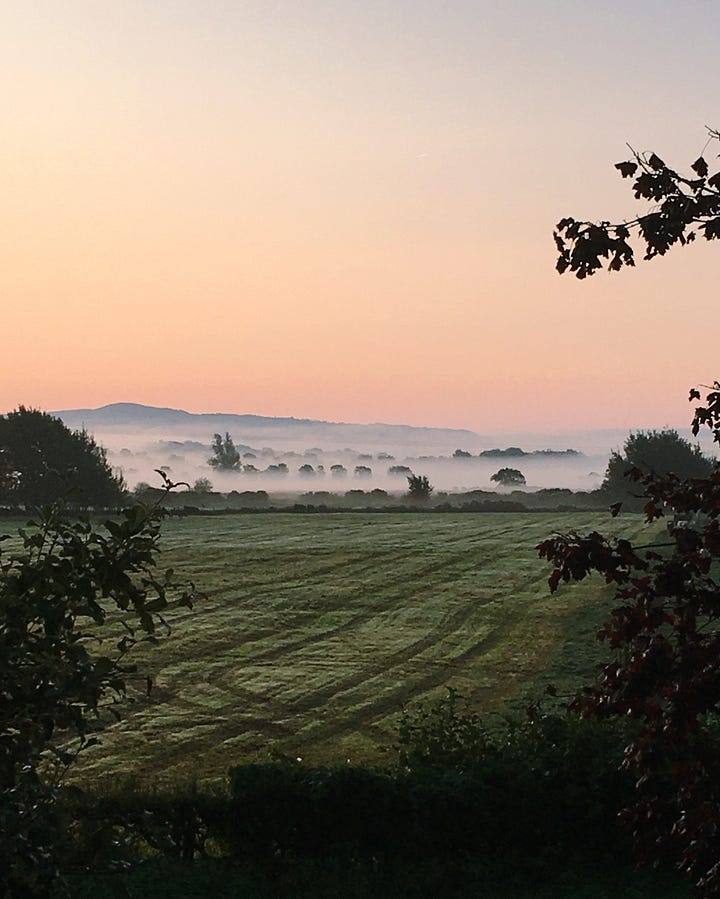
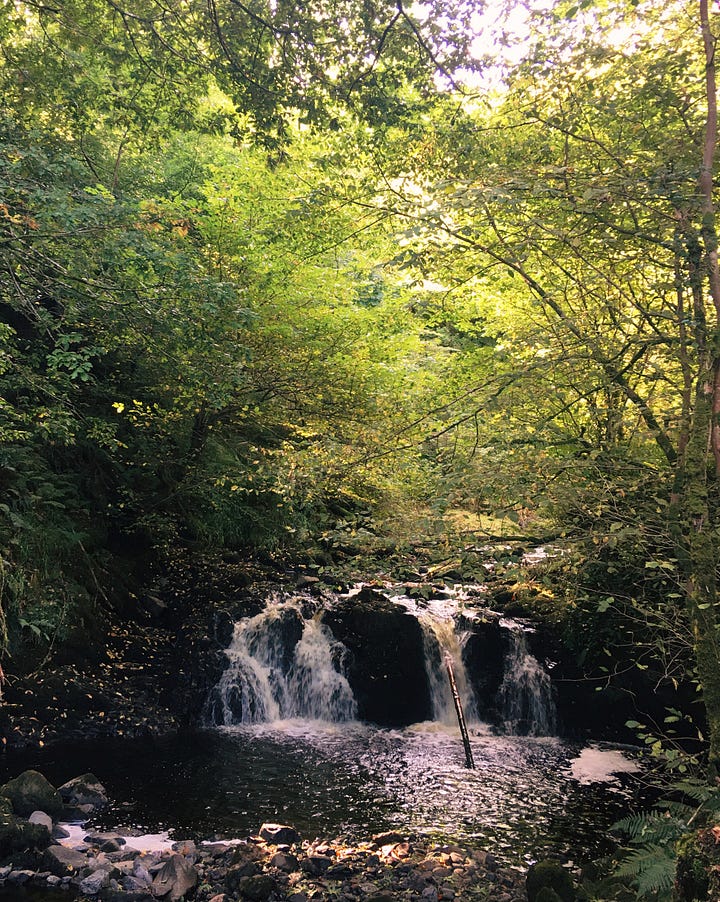
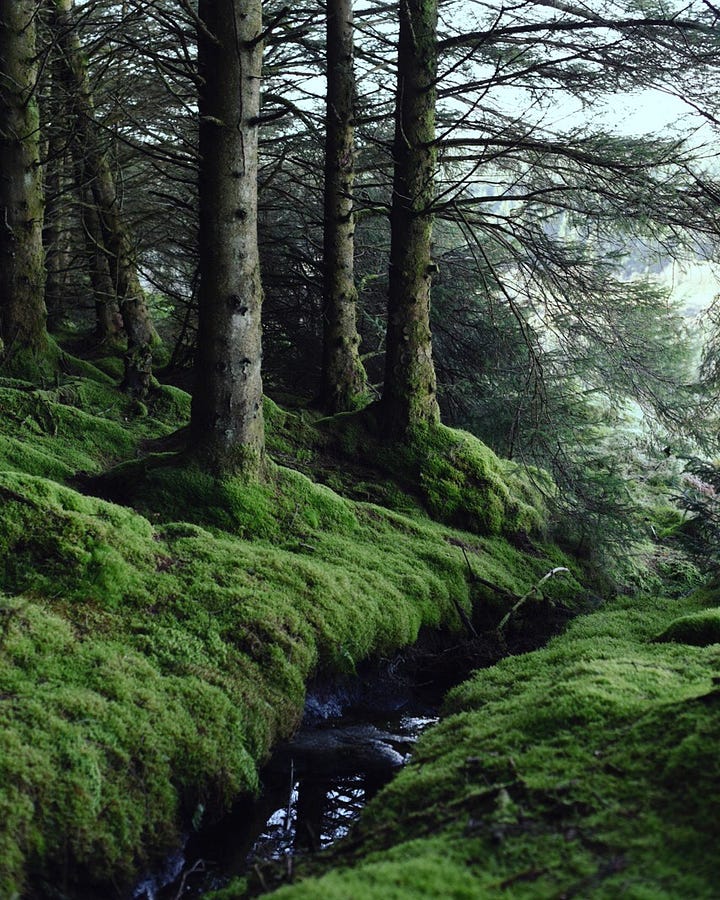
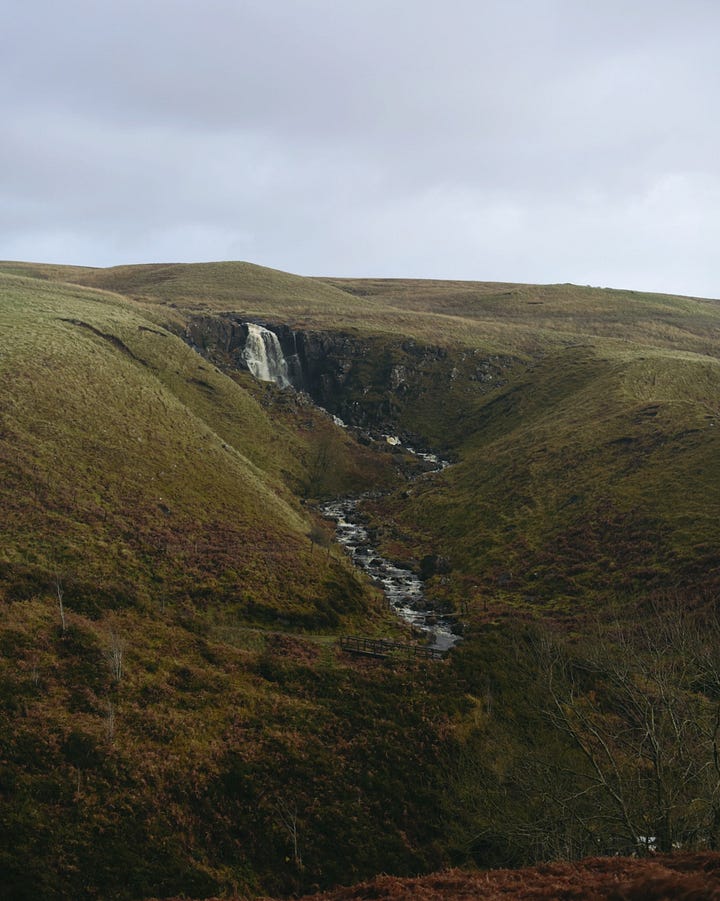

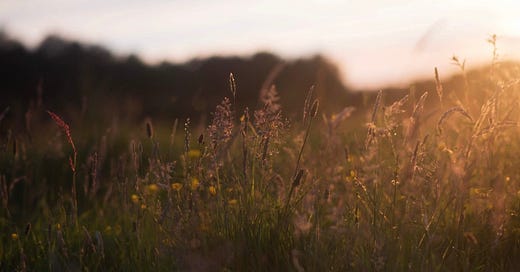



The Summer's gone, and all the flowers are falling...